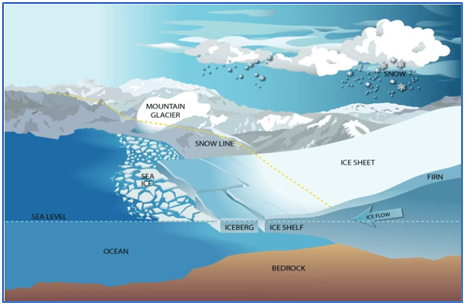Why in news?
- According to a new study, rapid melting of West Antarctica’s ice sheet due to warm waters around it is now unavoidable, no matter how much carbon emissions are cut.
- The study, ‘Unavoidable future increase in West Antarctic ice-shelf melting over the twenty-first century’, was published by the journal Nature last week.
- If lost completely, the ice sheet would raise the global mean sea level by 5.3 metres or 17.4 feet.
- If this happens, it would be a potentially devastating consequence for millions of people living in vulnerable coastal cities across the world, including in India.
What’s in today’s article?
What is an ice sheet?

- An ice sheet is essentially a mass of glacial ice that covers more than 50,000 square kilometres of land — roughly large enough to blanket Uttarakhand in ice.
- There are two major ice sheets in the world today: Greenland ice sheet and Antarctica ice sheet. Together, they contain about two-thirds of all the freshwater on Earth.
- This means that over time, when ice sheets gain mass, they contribute to a fall in global mean sea level, and when they lose mass, they contribute to a rise in global mean sea level.
How is the West Antarctic ice sheet melting?
- There are various processes through which ice sheets melt. One of them is when warm ocean waters melt ice shelves — the edges of an ice sheet which floats on the ocean.
- Ice shelves stabilise the land-based glaciers just behind them.
- If an ice shelf thins or disappears, these glaciers tend to speed up, discharging more ice into the ocean and causing sea level rise.
- Both ice shelves and ice sheets are different from sea ice, which is the free-floating ice that surrounds the polar regions.
- Sea ice is created by sea water freezing.
- The same process is taking place in West Antarctica. For decades, the region’s ice shelves have been depleting, glaciers have been flowing faster towards the ocean and the ice sheet has been shrinking.
News Summary: What the rapid ice melt in West Antarctica means
What are the findings of the study?
- The study shows significant and widespread future warming of the West Antarctica Sea and increased ice shelves melting.
- This will most likely lead to an increased sea level rise, which will affect coastal communities across the world, including in India.
- India has a long coastline and a dense population and is therefore vulnerable to sea level rise.
- If coastal communities cannot afford to defend against the rising seas, for example by building walls, the people would have to move elsewhere or become refugees.
Way forward
- According to the researchers, the melting West Antarctic ice sheet is just one contributor to sea level rise, which is just one impact of climate change.
- There are many other impacts which we can still avoid or limit: like the loss of the East Antarctic Ice Sheet, or the severity of heatwaves, droughts, and extreme rainfall.










